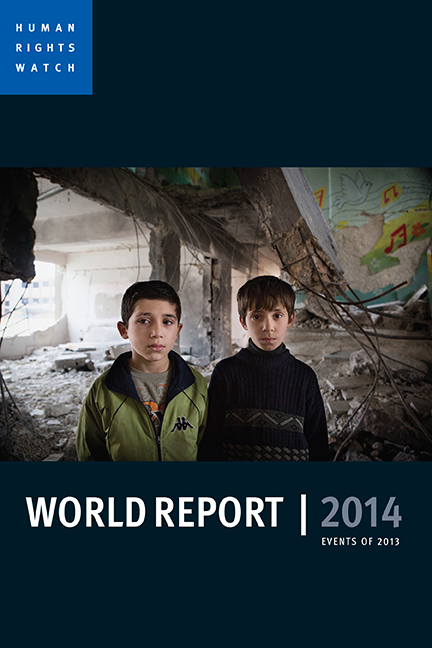Book contents
- Frontmatter
- Dedication
- HUMAN RIGHTS WATCH
- Table of Contents
- Foreword
- Rights Struggles of 2013: Stopping Mass Atrocities, Majority Bullying, and Abusive Counterterrorism
- The Human Rights Case for Drug Reform How Drug Criminalization Destroys Lives, Feeds Abuses, and Subverts the Rule of Law
- Putting Development to Rights: Integrating Rights into a Post-2015 Agenda
- The Right Whose Time Has Come (Again) Privacy in the Age of Surveillance
- Photo Essays
- AFRICA
- AMERICAS
- ASIA
- EUROPE AND CENTRAL ASIA
- MIDDLE EAST AND NORTH AFRICA
- UNITED STATES AND CANADA
- 2013 HUMAN RIGHTS WATCH PUBLICATIONS
- Acknowledgments
The Human Rights Case for Drug Reform How Drug Criminalization Destroys Lives, Feeds Abuses, and Subverts the Rule of Law
Published online by Cambridge University Press: 07 May 2022
- Frontmatter
- Dedication
- HUMAN RIGHTS WATCH
- Table of Contents
- Foreword
- Rights Struggles of 2013: Stopping Mass Atrocities, Majority Bullying, and Abusive Counterterrorism
- The Human Rights Case for Drug Reform How Drug Criminalization Destroys Lives, Feeds Abuses, and Subverts the Rule of Law
- Putting Development to Rights: Integrating Rights into a Post-2015 Agenda
- The Right Whose Time Has Come (Again) Privacy in the Age of Surveillance
- Photo Essays
- AFRICA
- AMERICAS
- ASIA
- EUROPE AND CENTRAL ASIA
- MIDDLE EAST AND NORTH AFRICA
- UNITED STATES AND CANADA
- 2013 HUMAN RIGHTS WATCH PUBLICATIONS
- Acknowledgments
Summary
Nearly every country in the world plays a part—as producer, consumer, or transit point—in the multibillion-dollar illicit drug trade that supplies more than 150 million people every year and keeps on growing.
To combat this trade, many countries over recent decades have launched so-called “wars on drugs” that entail crackdowns on participants large and small in the drug business, including harsh penalties for users.
Human Rights Watch has long documented the widespread human rights abuses resulting from this approach: in the United States, the devastation that disproportionate prison sentences for drug offenses have wrought on individuals and their families and disturbing racial disparities in drug law enforcement; in Mexico, the killings committed in the name of combatting drugs; in Canada, the US, and Russia, how fear of criminal law enforcement deters people who use drugs from accessing necessary health services, exposing them to violence, discrimination, and illness; in Afghanistan and Colombia, how narcotics production has fueled armed groups opposed or allied to the government; in India, Ukraine, and Senegal, how cancer patients suffer severe pain due to drug control regulations that render morphine inaccessible; and in China, Vietnam, and Cambodia, the “drug rehabilitation centers” where people are subjected to torture, forced labor, and sexual abuse.
But there was a growing sense within Human Rights Watch that this approach did not go far enough—that the problem did not lie merely with ill-considered policies or their abusive execution. Rather, the criminalization of drugs itself seemed to be inherently problematic. Especially when it came to personal possession and use, imposing the full force of the criminal justice system to arrest, prosecute, and incarcerate appeared contrary to the human rights to privacy and personal autonomy that underlie many rights.
Heavy emphasis on enforcing criminal prohibitions on drug production and distribution was also dramatically enhancing the profitability of illicit drug markets and fueling the growth and operations of groups that commit atrocities, corrupt authorities, and undermine democracy and the rule of law in many countries.
In my own work as Human Rights Watch's Colombia researcher from 2004 to 2010, it was clear that the illicit drug market was a major factor in the country's long-running war involving left-wing guerrilla groups, right-wing paramilitary groups, and security forces.
- Type
- Chapter
- Information
- World Report 2014Events of 2013, pp. 19 - 28Publisher: Bristol University PressPrint publication year: 2014

